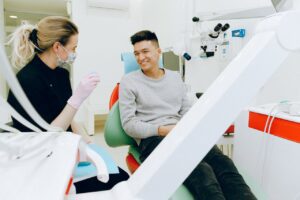Low testosterone is often a problem that men shy away from discussing. It can be a source of embarrassment, as they believe it damages their masculinity. They’ll ignore blatant signs of low testosterone because they’re too ashamed to face the issue head-on.
But if you experience this problem, you’re not alone. More than two percent of men in the U.S. have testosterone deficiency, but this number varies across different age groups. For example, as many as three-fourths of men over 80 years old have low testosterone.
Even younger men can develop testosterone deficiency (TD). Some factors that can put you at high risk for this condition include kidney failure, alcohol abuse, trauma to the testes, and certain metabolic disorders.
Are you unsure if you’re experiencing TD? Below, we’ve outlined seven signs of low testosterone in men that you should keep an eye out for.
1. Erectile Dysfunction
Testosterone plays a major role in releasing nitric oxide within your body. This molecule encourages blood flow by expanding your blood vessels. When you have low testosterone, you’ll likely have issues getting and maintaining an erection.
Erectile dysfunction is one of the most obvious symptoms of low testosterone, especially if you’ve never had issues with getting erections in the past.
Testosterone levels naturally begin to decline as you age — there’s no circumventing this reality. But you can begin a low testosterone treatment like testosterone replacement therapy (TRT) to combat this issue. Doctors can prescribe TRT in the form of pellets, patches, creams, gels, or shots. After about a month or two, patients usually see an improvement in the quality and duration of their erections.
2. Lack of Muscle
Are you going to the gym regularly and eating a protein-packed diet? If you don’t see any significant improvement in your strength or muscles’ appearance, you may have testosterone deficiency.
This hormone is necessary to build and maintain muscle. Without it, you’ll have a difficult time getting toned (and ripped).
While your muscles won’t be growing, your body fat might be. If you notice increased fat in your stomach and excessive breast tissue, low testosterone could be to blame.
3. Sleeping Problems
Sleeping like a baby every night gives you the energy you need to make it through the day and fulfill all your work and familial obligations.
In your younger days, did you fall asleep as soon as your head hit the pillow? Was your alarm the only thing that could wake you up? If you’ve since noticed a decline in your sleep quality, you may have low levels of testosterone.
One of the most intrusive side effects of low testosterone is insomnia. Testosterone is one of the key hormones that regulate sleep. When your body doesn’t have sufficient amounts of it, you’ll find yourself tossing and turning all night. As a result, you won’t feel fully rested and ready to tackle your day.
4. Lack of Energy
Even if you’re not suffering from a lack of sleep, you might feel less energized overall. Do you feel demotivated to complete your career-related tasks? Or have you lacked the stamina to go on your daily runs? If so, low levels of testosterone might be to blame.
General fatigue is a draining side effect of low testosterone. The loss of energy isn’t permanent, but you shouldn’t neglect this telltale sign of TD. Men who undergo TRT can often get back into their everyday routines within a few weeks of beginning their treatment.
5. Mood Changes
Are you normally a happy-go-lucky guy but find yourself getting irritable or feeling sad for no reason?
Just like estrogen regulates mood in women, testosterone regulates mood in men. While some mood fluctuations are normal, you may have testosterone deficiency if you feel stressed or grumpy more than you typically do.
6. Poor Cognition & Memory
Did you use to be a Jeopardy whiz who could recall an obscure president’s birth month? If you’ve been suffering lapses in your memory, low testosterone levels may be the culprit. Even difficulty concentrating can stem from a lack of this hormone.
Research shows that increasing men’s testosterone levels can lead to significant improvements in cognition and memory. So instead of blindly reaching for nootropics based on pseudoscience, you may need to begin testosterone replacement therapy.
7. Hair Loss
Some men have their mothers’ side of the family to thank for their balding heads. But genetics isn’t the only factor that determines if a man has a shiny head — low testosterone levels can come into play.
Now, the form of hair loss men experience can vary drastically. You may notice new bald spots appear. Or, your hair might be thinning on your head (as well as on your arms and legs). Some men even find it difficult to grow a full beard or mustache.
But one thing’s for certain — if you have low levels of this hair-stimulating hormone, your body hair won’t grow as much as it once did.
What to Do if You Exhibit Signs of Low Testosterone
Exhibiting signs of low testosterone can be frustrating, especially if you’ve been healthy and active all your life. But you don’t have to allow these symptoms to take over your life. Visit your primary care physician and tell them what’s going on.
Your doctor can administer a blood test to determine your testosterone levels. If they discover levels that sit below 300 ng/dL, you’ll have some degree of testosterone deficiency. You can discuss treatments with your doctor and review the benefits and potential risks of each option.
If you’re searching for additional fitness and health tips for men, check out more articles on our site!









